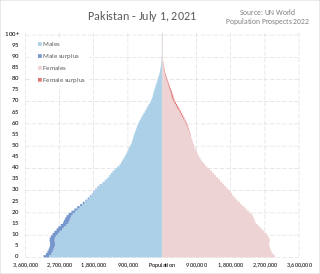
India is the most populous country in the world with one-sixth of the world's population. According to official estimates in 2022, India's population stood at over 1.42 billion.

Laos is a country in Southeast Asia. The country's population was estimated at about 7.43 million in 2021, dispersed unevenly across the country. Most people live in valleys of the Mekong River and its tributaries. Vientiane Prefecture, which includes Vientiane, the capital and largest city of the country, had about 569,000 residents in 1999. The country's population density is 23.4/km2.

The current population of Nepal is 29,164,578 as per the 2021 census. The population growth rate is 0.92% per year.

Pakistan had a population of 213,222,917 according to the final results of the 2017 Census. This figure includes Pakistan's four provinces, Islamabad Capital Territory, Azad Kashmir, and Gilgit-Baltistan. Pakistan is the world's fifth most populous country.

This is a demography of the population of Suriname, including population density, ethnicity, education level, health of the populace, economic status, religious affiliations, and other aspects of the population.

Bangladesh is the eighth-most populated country in the world with almost 2.2% of the world's population. As per the final results of the 2022 Census of Bangladesh, the country's population is 169,828,911.

The United States had an official estimated resident population of 333,287,557 on July 1, 2022, according to the U.S. Census Bureau. This figure includes the 50 states and the District of Columbia but excludes the population of five unincorporated U.S. territories as well as several minor island possessions. The United States is the third most populous country in the world. The Census Bureau showed a population increase of 0.4% for the twelve-month period ending in July 2022, below the world average annual rate of 0.9%. The total fertility rate in the United States estimated for 2022 is 1.665 children per woman, which is below the replacement fertility rate of approximately 2.1.

Mardan District is a district in Mardan Division of Khyber Pakhtunkhwa province in Pakistan. The district is named after Mardan city, which is also the headquarters of the district. The district is famous for its agriculture industry, Peerah(پیڑا) the famous sooghaat of mardan and for its archaeological sites of Takht-i-Bhai, Jamal Garhi and Sawal Dher.

Awaran District, is a district in the south of the Balochistan province of Pakistan.
The Census in Pakistan, is a decennial census and a descriptive count of Pakistan's population on Census Day, and of their dwellings, conducted and supervised by the Pakistan Bureau of Statistics. The 2017 Census in Pakistan marks the first census to take place in Pakistan since 1998. The most recent census was the 2023 Pakistani census.
Pakistani Australians are Australians who are of Pakistani descent or heritage. Most Pakistani Australians are Muslims by religion, although there are also sizeable Christian, Hindu and other minorities.
This article deals with topics related to the demographics of the city of Lahore, in Punjab, Pakistan.
The 1951 Census of India was the ninth in a series of censuses held in India every decade since 1872. It was also the first census after independence and Partition of India. 1951 census was also the first census to be conducted under 1948 Census of India Act. The first census of the Indian Republic began on February 10, 1951.

The 2017 Census of Pakistan was a detailed enumeration of the Pakistani population which began on 15 March 2017 and ended on 25 May 2017. It was the first census taken in the country in the 21st century, nineteen years after the previous one in 1998, and it was carried out by the Pakistan Bureau of Statistics.
The 2023 Census of Pakistan was the detailed enumeration of the Pakistani population and the seventh national census in the country. It was conducted by the Pakistan Bureau of Statistics. It was also the first ever digital census to be held in Pakistan, including the first in South Asian history.










